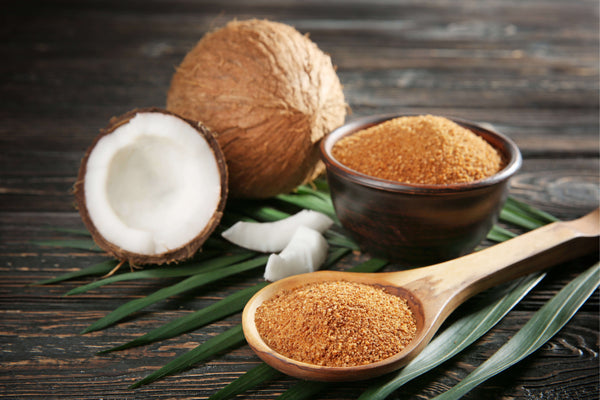Sugar, a beloved ingredient in the world of culinary delight, has faced increased competition from health-conscious consumers who are looking for natural or sugar-free healthier alternatives. Now, we have various sweetener alternatives, and coconut sugar is one of them. In this article, we will discuss the comparison between coconut sugar and traditional sugar, exploring their respective nutritional profiles, and potential health benefits.
Coconut sugar vs. sugar
Coconut sugar is derived from the sap of coconut palm trees( from flower buds). Despite its name, it lacks a distinct coconut flavour. This natural sugar is commonly known as coconut palm sugar or coconut palm sap. When it comes to both taste and appearance, coconut sugar closely resembles brown sugar with its brown hue and fine granules.
In contrast, traditional sugar often referred to as sugar table typically comes from sugarcane or sugar beets and goes through extensive refining processes that strip it of most nutrients.
One notable distinction lies in the processing method. Coconut sugar stands out for its minimal processing, where the sap is dried and packaged without further refinement. This approach helps to retain a higher quantity of essential nutrients such as zinc, magnesium, polyphenols, and iron nutrients. In contrast, table sugar undergoes extensive refining, resulting in a nutrient-depleted product.

Coconut sugar vs. sugar: Nutritional table
Based on a 4-gram serving size, here are the nutritional profiles of both sugars:
|
Nutrition Composition |
Coconut Sugar |
Sugar |
|
Calories |
50 calories |
50 calories |
|
Total fat |
0g |
0g |
|
Sodium |
0 mg |
0 mg |
|
Carbohydrates |
4g |
4g |
|
Fibre |
0g |
0g |
|
Sugar |
4g |
4g |
|
Protein |
0g |
0g |
From a calorie and macronutrient perspective, both sugars are nearly identical in composition. However, it's important to note that coconut sugar provides small amounts of nutrients that are not present in table sugar. This makes coconut sugar a slightly more nutrient-rich alternative.
Glycemic Index
The glycemic index (GI) of coconut sugar and cane sugar differs significantly. The GI measures how quickly a food impacts blood sugar levels. Coconut sugar has a low GI of 35, contrasting sharply with cane sugar's GI of 65. As a result, coconut sugar leads to a gradual and steady increase in blood sugar levels. This characteristic can be beneficial for individuals managing diabetes or aiming to stabilize their blood sugar levels.
Health Benefits
Coconut sugar has distinct health advantages in comparison to cane sugar. Now, let's explore these benefits in more detail.
- Blood Sugar Control: Coconut sugar stands out for its ability to contribute to better blood sugar control. One remarkable feature of coconut sugar is its lower glycemic index (GI) in comparison to cane sugar. This attribute makes it an excellent option for individuals with diabetes or those seeking effective sugar intake management.
By preventing rapid spikes and subsequent crashes in blood sugar, it helps maintain stable energy levels and reduces cravings for sugary foods.
- Nutrient Content: The nutrient content of coconut sugar and cane sugar differs. While both sugars lack significant nutritional value, coconut sugar offers a slight advantage in terms of micronutrients. It contains traces of essential minerals like iron, zinc, and magnesium, albeit in small amounts. These minerals contribute to the overall nutritional profile of coconut sugar.
On the other hand, cane sugar provides only empty calories without any noteworthy nutrients. Although the micronutrient content in coconut sugar is not enough to replace nutrient-dense foods, it's important to consider another source of nutrition, like you can take sugar-free multivitamins gummies in your diet.
- Antioxidants: Coconut sugar is known for its antioxidant properties, attributed to the presence of polyphenols and flavonoids. The polyphenols and flavonoids present in coconut sugar act as scavengers, helping to neutralize free radicals and reduce the risk of these health conditions.
While coconut sugar doesn't have as high antioxidant content compared to certain fruits and vegetables, it still contributes to your overall antioxidant intake when used moderately.

Conclusion
Coconut sugar and white sugar may appear similar, however, they have distinct nutritional profiles and offer different health benefits. Coconut sugar offers more health benefits than traditional sugar. If you prioritize a sweetener with moderate nutrition and a lower glycemic index, choosing coconut sugar would be preferable.


